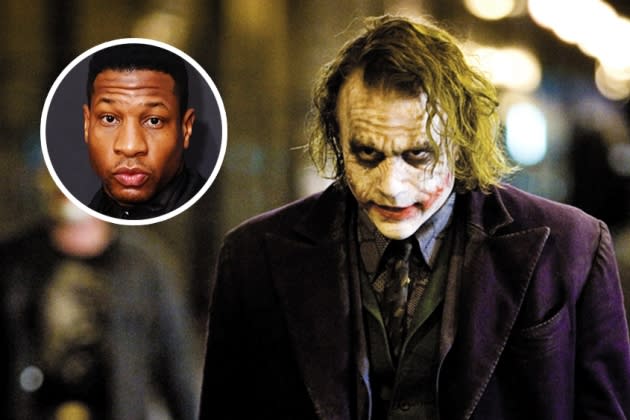Jonathan Majors on How ‘The Dark Knight’ Shows ‘What It Means to Be Human’

This essay is one of several contributed by filmmakers and actors as part of Variety’s 100 Greatest Movies of All Time package.
“And here we go,” a simple line spoken like a prayer from one of the most complex characters to ever grace the silver screen, Heath Ledger’s Joker, in Christopher Nolan’s film “The Dark Knight.” Let’s paint the picture: 2008, Dallas, Texas, 18-year-old me, my high school sweetheart, and her very, very cool father. The three of us, popcorn in hand, Cokes and candies in tow, and lest I forget to mention, it’s a midnight showing and my very first midnight showing ever. We settle in, get cozy, and what transpires between that screen and my 18-year-old self to this day is remembered and recalled with the vigor of youth and tenacity of self-exploration. So, “here we go.”
More from Variety
Christopher Nolan’s “The Dark Knight” is one of those rare films that entertains at the highest cinematic rung while simultaneously challenging its audience with each frame to reach higher in their own self and social knowledge, teasing our retinas with color palettes and patterns that prescribe meaning, and incites debate in our imaginations and the collective subconscious. Did you notice how the eyes of both Christian Bale’s Batman and Ledger’s Joker are painted similarly, blackened by what looks like the love child of oil and charcoal, as if these two men, as dissimilar as they may appear, have seen the same things and perhaps see them the same way? This moral theme and argument prevail throughout the picture. What is right and what is wrong? My 18-year-old self sat in the cinema long after the credits rolled, gobsmacked by a beauty and complexity of humanity hitherto unwitnessed in cinema and dare I say in my own existence.
They were the same. How was this possible? After all, one, Batman, is the “good guy” and the other, the Joker, the “bad guy.” What made them different is what they decided to do after seeing and reckoning with a Gotham that was just as morally challenging, ambiguous and fluid as the characters that populate its police force. All of the actors embody their characters with such ease and relatability.
And the film asks what it is to be human, what it is to be alive and to participate fully in one’s own living. “The Dark Knight” etches so vividly the agnostic morality of survival and the discipline of goodness. Nolan’s second installment of the “Dark Knight” trilogy holds in its run time an impregnable truth: Life and people are beautifully complicated and evolving. It is this fact that has allowed “The Dark Knight” to stand up and stand out all these many years later. In my many rewatches, it continues to demonstrate for me the agility of the human spirit. It displays, with perhaps one of the greatest rivalries of all time to make its way to “celluloid” — that of Bale’s Batman and Ledger’s Joker — that each step of our lives is moving us towards being the hero or villain of our tale. And that the few things that can truly guide us are our empathy and hope for a greater tomorrow, with a dogged belief in the goodness of ourselves, others and our own personal Gotham. Follow the goodness. Believe in the goodness.
Jonathan Majors is the star of “Devotion,” “Ant-Man and the Wasp: Quantumania,” “Magazine Dreams” and “Creed III.”
Best of Variety
Sign up for Variety’s Newsletter. For the latest news, follow us on Facebook, Twitter, and Instagram.

